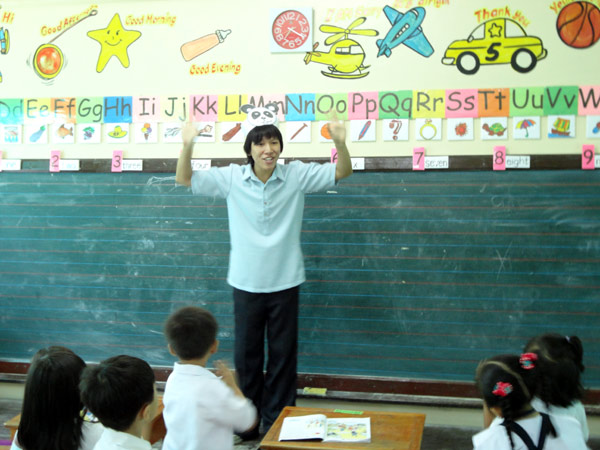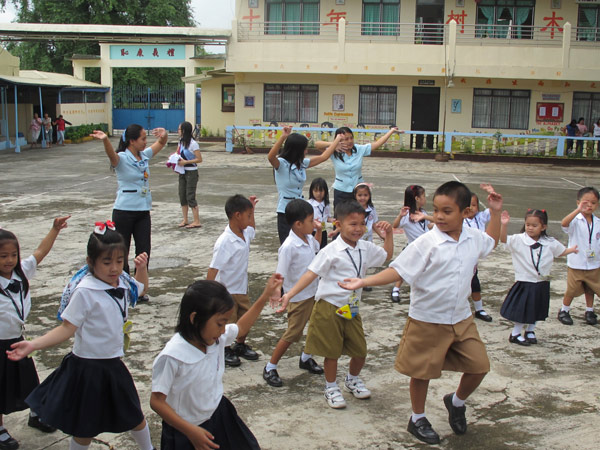From Beijing to Santiago City
Updated: 2011-09-25 09:39
By Chen Huangchao (China Daily)
|
|||||||||
 |
|
It's a challenge getting his young charges to pay attention in class, but Chen Huangchao is slowly learning the tricks of the trade. [Provided to China Daily] |
Chen Huangchao, 23, tells how he deals with restive kids, cockroaches and piled-up laundry as he travels far to help children in the Philippines get in touch with their Chinese roots.
Less than a year ago, when I started my postgraduate studies in preschool education at Beijing Normal University, I never imagined I would be teaching kindergarten in the Philippines today.
In January, my tutor told me that there was a chance to go abroad to teach Chinese, but I would need to pass an interview first to qualify. I did not really expect to be chosen but I thought the process would be a good experience, and fun.
About a month later, I got a call from the Office of Chinese Language Council International (known colloquially as "Hanban"), the agency that administers the Confucius Institutes abroad. I was selected to begin a 10-week training session at Tianjin Nankai University, and face another examination later.
During the training session, we learned a lot about Chinese culture and teaching skills. Also, we practiced teaching to gain confidence, so that we would not be terrified once we were in front of a class.
Finally, our group of 24 teachers arrived in Manila in late May.
Six of us would go on to the Santiago Cultural Institute, a 62-year-old Chinese school in the northeast part of Luzon island. It offers classes in both English and Chinese, and has a very good reputation for its university entrance rate.
Our principal Jaime Go showed us around Manila for two days. The most fascinating place for us was the SM Supermall, one of the biggest department stores in Asia. We all bought post cards and small souvenirs.
The next evening, after a tiring eight-hour drive, we reached the school. It is a really small institution compared to the schools in China.
Each grade, from nursery through high school, has only one class, and in total there are no more than 200 students.
Two days before the school semester started, we arranged to meet all the English teachers. Each class has one English adviser, and each Chinese teacher has to teach two classes. I was assigned to teach Kindergarten 1 and Grade 2.
My teaching career in the Philippines was now sailing.
 |
|
These primary students from Santiago City are getting a head start in Chinese studies thanks to their Hanban teachers. [Provided to China Daily] |
After my earlier internship at a Shanghai kindergarten, the Filipino kids seemed naughty beyond my imagination. My Kinder 1 and Grade 2 are the biggest classes in this school. After the first few weeks, my throat was absolutely hoarse.
But everyday as I walked around the campus, the students would say "Good morning, Mr. Chen" or "We like you, Mr. Chen", and I would feel so gratified and forgive them again and again.
All in all, they are just young kids.
The first few weeks, many of the children could not get used to their new environment here. They cried a lot. I tried many ways to make them happy and focus in class, but all failed.
Then Velarmi, our Filipino Kinder 1 adviser, gave me a rubber stamp and some stickers. She told me if I gave these kids some reward, they would be easier to teach. And yes, now, they love me more than ever.
We Chinese volunteers are quartered on the second floor of the school dormitory and the principal and his wife live on the ground floor. The Philippines is a tropical country, so I have made the acquaintance of all kinds of insects: cockroaches, mosquitoes, ants and houseflies. Either the house lizard is not very hungry, or there are just too many of these pests.
Our food is prepared for us. We each pay 3,000 pesos a month and we eat in the dormitory, so we can save our time to prepare for classes. Nanny always prepares local food for us, so we enjoy Filipino cuisine everyday without stepping out.
But laundry is hard work. After teaching several hours a day, we are usually exhausted. So my ritual is to wash my clothes every Saturday morning. Although it will take me two hours to finish them by hand, I can restore my energy by taking a nap later, and the whole Sunday will be mine. I really hope the school will get an automatic washing machine soon.
Santiago City is not very big. There is no shopping mall here, but a lot of supermarkets and open-air markets where you can get your daily needs.
In consideration of the visiting teachers' safety, every time we go off campus to shop or eat, we have to get written permission (a gate pass), so the security guard will let us leave for a few hours. It's a bit inconvenient, but somehow it is very necessary, I think.
While we are out, we like the pizza at a place called Greenwich, which we think tastes better than Pizza Hut. Fast food at Jollibee and Chowking restaurants is also very popular and if you come to the Philippines, you must try the "halo-halo", an ice-cream dessert.
There are still six months ahead of us, but I think I have already have gained a wealth of experience. There is an English saying, "All experience is good experience." No matter what obstacles I am about to face, I am sure I can overcome them by adjusting my own mentality.
You can contact the writer at sundayed@chinadaily.com.cn.










